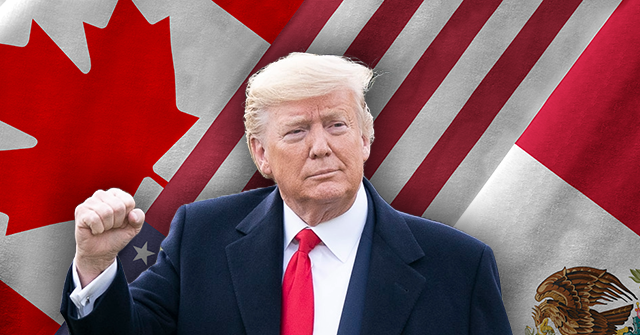Why Is Anyone Surprised Trump Is Serious About Using Tariffs?
President-elect Donald Trump said on Truth Social that he would impose sweeping new tariffs on Mexico and Canada through an executive order that he would sign on January 20, the day he is scheduled to take the presidential oath of office.
Trump’s post caught many people by surprise, which is itself surprising. Trump has been very clear that he plans to use tariffs as a tool to pursue U.S. geopolitical interests. He does not look at tariffs as simply a “protectionist” policy to defend critical U.S. industries. Instead, he sees tariffs and access to U.S. markets as leverage to win cooperation from our trading partners and economic rivals.
Here’s the post in full:
As everyone is aware, thousands of people are pouring through Mexico and Canada, bringing Crime and Drugs at levels never seen before. Right now a Caravan coming from Mexico, composed of thousands of people, seems to be unstoppable in its quest to come through our currently Open Border. On January 20th, as one of my many first Executive Orders, I will sign all necessary documents to charge Mexico and Canada a 25% Tariff on ALL products coming into the United States, and its ridiculous Open Borders. This Tariff will remain in effect until such time as Drugs, in particular Fentanyl, and all Illegal Aliens stop this Invasion of our Country! Both Mexico and Canada have the absolute right and power to easily solve this long simmering problem. We hereby demand that they use this power, and until such time that they do, it is time for them to pay a very big price!
The Wall Street Journal described this as “the clearest indication since his election victory that he plans to follow through on the tough campaign rhetoric that helped propel him to the White House.” It’s hard to imagine why anyone needed that to be made clear, but the immediate reaction to Trump’s Truth Social post made it clear that sending that signal was actually necessary.
The Tariffs Threat Is Trump’s Opening Gambit
The Truth Social announcement not only threatened tariffs; it also laid out the path away from tariffs. If Mexico and Canada cooperate with the U.S. government under Trump’s leadership in securing our border from fentanyl and illegal migration, they will maintain their current access to U.S. markets.
This is an example of what Treasury Secretary nominee Scott Bessent has described as escalating to de-escalate. It is Trump’s opening gambit in three-party negotiations over the shape of trade, border, and drug policies. The fact that the announcement of this policy came so early—two months before Trump’s inauguration—means that Trump is giving Mexico and Canada plenty of time to submit their counter-offers and reform their own policies to comply with the incoming administration’s goals.
Trump’s ask is hardly onerous. Neither Mexico nor Canada has a strong self-interest in resisting U.S. border control or facilitating the fentanyl trade. Both have an extremely strong self-interest in maintaining their access to U.S. consumers. As Sara Eisen of CNBC pointed out, 77 percent of Canada’s exports and 83 percent of Mexico’s go to the United States. Mexico’s exports to the U.S. add up to nearly one-quarter of its gross domestic product.
The initial reaction to Trump’s message from Mexico’s President Claudia Sheinbaum is being viewed as a threat of retaliation if the U.S. imposes tariffs.
“The phenomenon of migration or the consumption of drugs in the United States will not be dealt with by threats or with tariffs,” Sheinbaum wrote in a letter to Trump on Tuesday, which she read out at her daily press conference. “One tariff will come in response to another, and so on until we put shared companies at risk.”
This is likely posturing for the domestic Mexican audience rather than a sign that Mexico will not negotiate with the Trump administration. But it may also be a test of Trump’s resolve. Trump may have to raise tariffs in order to show Sheinbaum that he really means business.
Ultimately, however, we expect that Mexico and Canada will agree to terms that will allow them to avoid anything on the scale of 25 percent tariffs. The cost of doing otherwise to their economies would be too high.
Read the full article here


